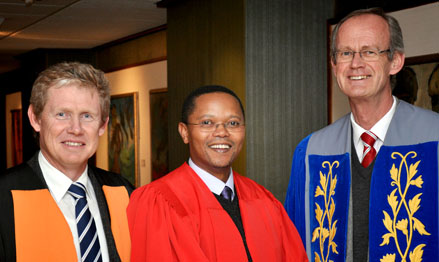Latest News Archive
Please select Category, Year, and then Month to display items
13 December 2024
|
Story Anthony Mthembu
|
Photo Charl Devenish
 Lieutenant Colonel Dr Rifa Tshivhase, Head of the Department of Surgery at 3 Military Hospital in Bloemfontein, addressed graduates within the Faculty of Health Sciences at the University of the Free State on 10 December 2024.
Lieutenant Colonel Dr Rifa Tshivhase, Head of the Department of Surgery at 3 Military Hospital in Bloemfontein, addressed graduates within the Faculty of Health Sciences at the University of the Free State on 10 December 2024.
Momentous and joyous – these are some of the words used to describe the December 2024 graduations at the University of the Free State (UFS). In celebration of the academic achievements of its students, the UFS hosted graduation ceremonies at the Callie Human Centre on its Bloemfontein Campus from 9 to 10 December 2024.
Prof Anthea Rhoda, acting Vice-Chancellor and Principal of the UFS, encouraged the graduates to always acknowledge and recognise the significance of this achievement as they transition from being UFS students to being UFS graduates.
Undergraduate and postgraduate achievements
At least 2000 undergraduate qualifications and postgraduate qualifications were conferred. As such, there were some standout academic achievements across the sessions. For instance, Itumeleng Pooe received his Advanced Diploma in Theology cum laude, making him the only graduate in the Faculty of Theology and Religion to receive his qualification with distinction during these graduations. In addition, Dr Bobuin Jr Valey Gemandze Oben – at just 28 years old – was the youngest PhD graduate from the Faculty of Law at the graduation ceremony, which took place on the morning of 9 December 2024.
Conferring Honorary Doctorates
Some highlights from these graduations were the recipients of honorary doctorates, as well as the keynote speakers. The Faculty of Economic and Management Sciences (EMS) at the UFS conferred an honorary degree on Prof Murray Leibbrandt, Research Chair in Poverty and Inequality Research in the Southern Africa Labour and Development Research Unit (SALDRU) at the University of Cape Town (UCT). In addition, the Faculty of The Humanities at the UFS conferred an honorary degree on HE Bineta Diop, Special Envoy of the Chairperson of the African Union Commission on Women, Peace, and Security.
On the final day of the graduations, graduates within the Faculty of Health Sciences at the UFS were addressed by Lieutenant Colonel Dr Rifa Tshivhase, Head of the Department of Surgery at 3 Military Hospital in Bloemfontein. In her address, Lieutenant Colonel Dr Tshivhase encouraged and challenged the graduates to actively seek out good in the world.
As the December 2024 graduations concluded, several of the graduates within the Faculty of Health Sciences indicated that the most memorable moments in the session were the cheers and applause they received as they walked across the stage.
Inaugural lecture by Prof Kwandiwe Kondlo
2011-08-26
|

|
|
Present at the inaugural lecture of Prof Kwandiwe Kondlo were from the left: Prof. Lucius Botes, Dean of the Faculty of Humanities; Prof. Kwandiwe Kondlo and Prof. Teuns Verschoor, Vice-Rector: Institutional Affairs
Photo: Stephen Collett
|
Can the South African Communist Party (SACP) ever become a viable option for the ANC or has it become just a flat spare-tyre of the ruling party? Is there more to expect from the SACP or has it run full cycle? These are some of the questions that were brought up by Prof. Kwandiwe Kondlo at his inaugural lecture at our university on 24 August 2011.
Prof. Kondlo, head of our Centre for Africa Studies, told the audience that the current SACP (unlike pre-1994) is a party in which theory and intellectual reflection were being eclipsed by politics of pragmatism and warned that self-interest and ambition have become a problem. Delivering his lecture on the topic The South African Communist Party and the Dilemma of the National Democratic Revolution in South Africa, 1994 to date, Prof. Kondlo warned that he may ruffle feathers amongst those with ideological commitments and said that as an intellectual it was his job to irritate.
Prof. Kondlo told the audience his lecture would re-open old debates telling them that old questions are making way to the fore, for example the nationalisation debate.